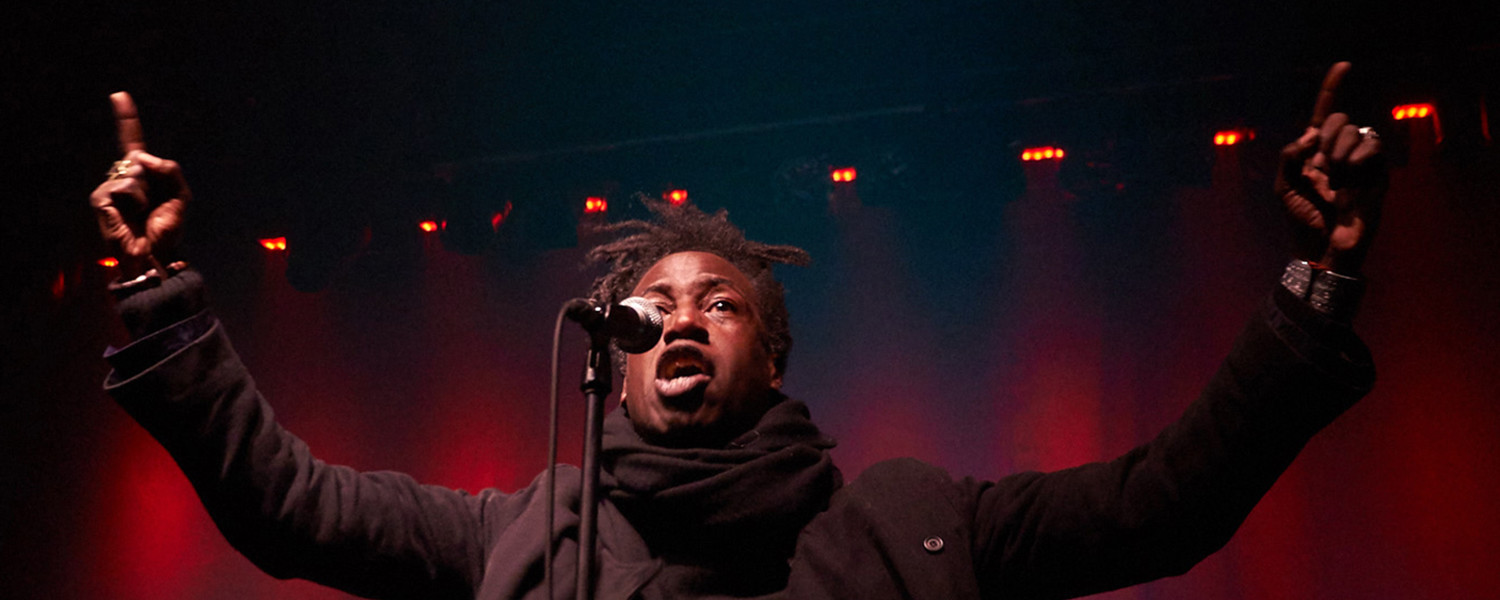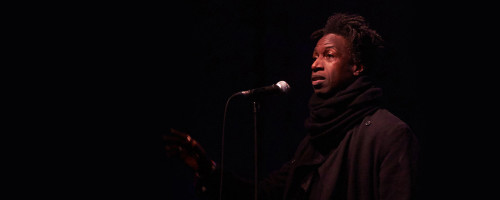Saul Williams is undefined.
And as such he leaves his performances up for interpretation by his audience. He doesn’t pre-determine what he wants them to take away from it, he’d rather leave it to the element of “surprise”.
“Would I like them to walk away inspired? Perhaps, but that’s not necessary,” he says, minutes before performing alongside Canada’s k-os at Toronto’s Danforth Music Hall, during the Canadian leg of his worldwide tour.
“Inspiration works in many ways,” he continues. “Some people may not like it, some people may be uncomfortable, some people may be really into it and maybe those people are connected or will connect and share their opinions …”
Later, on stage, he combines his vocal instrument with a spastic demeanour and powerful words to the enjoyment of his fans.
I’d like people to be reminded of the possibilities of expression and art.
Words remain Saul’s tools in delivering truthful messages about society’s current woes and misconceptions. The multi-faceted artist once again proves this on the first three singles released off his forthcoming release, MartyrLoserKing, “The Noise Came From Here”, “Burundi” and “Horn of the Clock-Bike”.
“I guess, if anything, I’d like people to be reminded of the possibilities of expression and art [during my performance],” he adds.
 EXPLAIN THE IMPORTANCE OF SELF-EXPRESSION AND IMAGINATION TO YOU. I think that each and every one of us are born into things that we classify ourselves as belonging to, whether it’s gender, race, nationality, heritage. What’s great about the ability to empathize and the ability to imagine is that you can begin to realize that you are so much more than what you are born into. Sometimes the way that you achieve that understanding is through different forms of expression, whether it’s changing the way you dress or the way you talk about things or creatively through art … We are evolving organisms and expression is one of the ways through which we evolve and also foster evolution.
EXPLAIN THE IMPORTANCE OF SELF-EXPRESSION AND IMAGINATION TO YOU. I think that each and every one of us are born into things that we classify ourselves as belonging to, whether it’s gender, race, nationality, heritage. What’s great about the ability to empathize and the ability to imagine is that you can begin to realize that you are so much more than what you are born into. Sometimes the way that you achieve that understanding is through different forms of expression, whether it’s changing the way you dress or the way you talk about things or creatively through art … We are evolving organisms and expression is one of the ways through which we evolve and also foster evolution.
IN YOUR RECENT BOOK U.S. (a.), YOU TALK ABOUT WHITE PRIVILEGE AND WHAT IT MEANS TO BE A BLACK AMERICAN. WHY DID YOU WANT TO TACKLE THAT TOPIC? In travelling, what I have found is that I may experience one thing at home, but when I travel, I travel essentially with my passport, one as a human being, but then two, as an American. I realize how exposed, and sometimes overexposed, I am to privilege, even as a Black American, when I travel … Like holy shit, we know people here who we may classify as poor and we go to other places and we [realize] there’s a difference. You realize that poverty is a construct … you may encounter people who do not have things like you, but do not classify [themselves] as poor because they are self-sufficient. It helps to sort of shift perspectives in order to realize that the construct of race is one thing, but the construct of reality is even broader than that. We have to disintegrate and dismantle things like the idea of white privilege and realize that if you’re an American talking about that, whatever race you are, you have also experienced a great deal of privilege or comfort that comes at others’ discomfort.

WHAT ARE SOME EXAMPLES OF PRIVILEGE THAT YOU’VE EXPERIENCED IN YOUR LIFE? Oh, everything. I mean, I’m backstage at a concert right now where people are asking me, ‘Is there anything that you need?’ I’m being paid to speak for 45 minutes and I can say whatever the f*ck I want to say – that’s all privilege. I’m living, breathing, being fed, being taken care of. All of it is privilege … For example, I spoke to a friend yesterday who was at that concert that got shot up in Paris and she was saying, ‘Why me? Why do I get to experience this privilege in life and everyone else around me was murdered?’ … It’s a question we all ask in our moments of greatness and our moments of ‘ugh, why me?’ But we’re alive, privilege starts there.
I KNOW THAT PARIS IS VERY IMPORTANT TO YOU, SO WHAT ARE YOUR THOUGHTS ON THE RECENT ATTACKS IN PARIS? This – maybe except for hearing about Nigeria and Mali and other instances where people are coming into villages that have nothing to do with the shit and are going into schools – this to me, struck me as an actual instance of terrorism. I felt like Americans [were] using the term loosely and also not using the term loosely, because terrorism exists within the United States. What happened in Charleston, the police, terrorism exists there [but] they won’t use [that term], but they’ll use it elsewhere, even in places where [the Americans are] the terrorist. In [the case of what happened in Paris] I was like ‘f*ck’ because they went to local shit where real Parisians hang and were like ‘yeah let’s really f*ck this shit up,’ so it’s crazy … I knew people in a few of the places that were attacked, that’s always difficult, when you know people personally.
IN TERMS OF THE BLACK LIVES MATTER MOVEMENT, WHY DO YOU THINK IT’S BETTER TO USE POETRY RATHER THAN REGULAR CONVERSATION TO GET A MORE EFFECTIVE RESPONSE FROM PEOPLE? Well, it’s not that I think it’s better to use poetry, it’s simply that I think that art is always useful. Art transcends dialogue because it holds the potential to speak to the heart of something that can transcend what you readily understand or know, and go directly to what you feel … Art speaks to the subconscious and we need to speak with our subconscious more in order to come to fuller and clearer understandings of things beyond ourselves.
Art speaks to the subconscious and we need to speak with our subconscious more in order to come to fuller and clearer understandings of things beyond ourselves.
TODAY’S SOCIETY USES SOCIAL MEDIA AS A FORM OF SELF-EXPRESSION. HOW DOES THIS CHANGE THE POWER IN WORDS? It doesn’t change the power in words, but it does let you see … how destructive language can be, for example the comment sections of [posts]. Sometimes it’s not directed at you so you can be like, ‘Wow that’s f*cked, glad I’m not Meek Mill.’ (laughs) … I don’t think it affects the power of language itself, but I do think that there are acts of negligence with language that you see more readily.
FINALLY, I HAVE TO SNEAK THIS ONE IN AS A FAN OF THE SHOW, WHAT WAS IT LIKE TO PLAY THE ROLE OF SIVAD ON “GIRLFRIENDS” AND MERGE BOTH ACTING AND POETRY TOGETHER? It was super cool. I was friends with the producers first and when they asked me to participate, they told me to help them develop the character. I felt privileged in that experience because I got to bring some of my ideas to the table, which isn’t always the case in an acting job … I have a lot of respect for everybody that was involved in that show. It was mostly women in front and behind the camera. I was always really impressed with how the other actors, if they had issues with what was going to be said, if there was fat shaming or something, they would stop that production and be like, ‘Hey, I don’t feel comfortable saying this because …’ and they would have it out with the writer or producer right then and there and it would shift towards something they felt like was more productive. I had a lot of respect for how that show was handled.
Photos By. Janelle Scott-Johnson © Urbanology Magazine




Comments are closed.